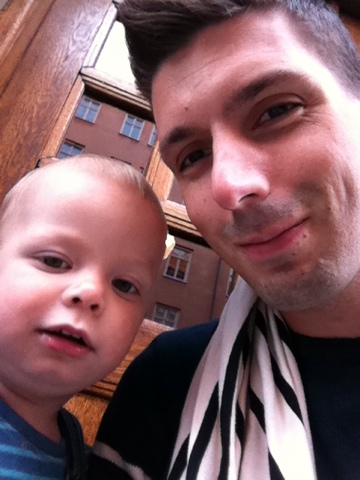Prejudices, emotions and misattributions
30 januari 2012 | In academia Emotion theory Hate Crime Moral Psychology politics Psychology | Comments?In my earlier forays into the theory and science of emotion, there was one thing that struck me as extremely potent as an explanation: misattribution. Misattribution (frequent appeal to which is made by social psychologist Jonathan Haidt and colleagues) often goes like this: You have an emotional reaction, positive or negative, and you look for a reason for why you might have this reaction by scanning the environment for salient differences that might account for it. Haidt calls this ”post-hoc rationalisation”. Post-hoc rationalisation results in misattribution when the reason you take to account for your emotional reaction does not correspond to what in fact caused it.
This is a quick, often unreflected, process and it seems to be quite widespread. But people differ enormously in what type of rationalisations and attributions they tend to make. Some will often blame their own flaws for any negative reaction to a situation, others will blame the food, their company, the climate, or just the nearest person. The process is also often very useful: we need to explain our negative and positive reactions, and we need generalised explanations if we are to make plans for how to live our lives if we are to avoid these unpleasant experiences and make the pleasant ones more frequent.
Now, our emotional reactions are caused by a vast combination of factors. Some we are aware of, or can become aware of, some are welcomed, and some we are reluctant to accept. I like avant garde jazz, but I also very much like the fact that I like it. It’s part of my self-image. This being true, any unpleasant encounter with avant garde jazz tends to be blamed on the circumstances. In fact, even if my last five, or ten encounters would have been unpleasant, I would be unlikely to attribute this to my tastes having changed.
If you are prejudiced against certain people (this based on group or individual characteristics), you are likely to attribute the valence of any negative emotional reaction you have encountering these people to them. If you are unaware of your prejudice, or unaware of that it is a prejudice (perhaps because you are reluctant to accept it), you are likely to try to find some rationalisation of your reaction that correspond to your considered view of what constitutes a proper reason for an emotional reaction.
Discrimination very rarely proceed by someone being ruled out on basis of group membership. All stops pulled apartheid is very rare. Rather, everyday discrimination proceed by people having an averse reaction to a person or situation, and then looking for something that could be treated as an acceptable reason to disfavour that person.
Let’s say I am interviewing people for a position as a research assistant, and one of the applicants is female. Let’s say I’m prejudiced against women, but I don’t think I am. So I have an averse reaction (this is my prejudice being manifested) and I start looking at the applications for a reason why I might have this reaction. And it turns out the female applicant’s typing skills are somewhat worse than the male applicants. ”Ah – typing! Typing is very important for a research assistant”. This is a proper reason, even if it’s not my reason and it’s not a good enough reason to determine who get’s the job.
Prejudices, in other words, often work by making the prejudiced person more likely to find some acceptable reason on the basis of which he/she may discriminate against the target group. This sort of discrimination is probably quite common, but exceedingly hard to prove, especially for the person who exhibit this strategy (very often not knowing it).
The phenomena on which this is built – post hoc rationalisation/explanation, is, as mentioned, a very useful cognitive feature and we wouldn’t want to get rid of it. In fact, generalizations are often very useful, and generalizations and prejudiced are quite clearly related. What we need, of course, is better generalizations, and making sure that this process properly correspond to the reasons we accept. I’m guessing (because the jury is still very much out on what works for prejudice-reduction) that what’s required is that we, contrary to inclination, approach that to which we have averse reactions, to find out more about the proper cause of that reaction, hoping to calibrating our reactions to what actually matters. (This may, for all I know, be what Gordon Allport meant by the ”contact-hypothesis”, btw).
Resolution
2 januari 2012 | In Psychology Self-indulgence | 1 Comment
As far as New Year Resolutions go, this is admittedly a rather weak one, but here goes: I solemnly swear to at least try to lighten this blog up a bit, by posting every now and then on something other than hate crime.
It wont be the next one: that will be on hate crime and the notion of punishing a cause and you will read it and like it and perhaps even beg me to reverse my resolution because you are so very, very fickle, are you not, reader? Reader?
 Oh. Right.
Oh. Right.
There goes the neighbourhood
21 december 2011 | In Crime Ethics Hate Crime politics Psychology Uncategorized | Comments?
What counts as a hate crime?
Among the first questions you should ask when being introduced to a new category-concept is this: what does it cover? What qualifies as an ”X”? When given a fairly informative definition, you then quickly go on to fringe cases, and ask whether they qualify or not. This technique will make you seem polemic and lacking in seriousness. If you’re a decent philosopher, that’s at least partly true.
We need fringe cases in order to lure out the differences between theoretical models, and also to test the plausibility of these models.
Hate crimes, as we know, invoke a combination of factors, mainly crime, prejudice and the small but very significant and problematic notion of ”because of”. A crime is a hate one when it is committed because of a prejudice against a certain group (membership in which is based on some to-be-determined characteristic important to the victims’s, or somebody’s ”identity).
Now, it’s important to note that committing a crime because of a prejudice against a group, is more narrow than committing a crime because of group membership. I may believe (rightly) that the elderly are less able to catch me, running from the scene of the crime, and therefore target them. According to the so called ”victim selection model” for hate crimes, this might qualify simply because group mebership was part of the reason why I picked out this particular victim. According to the animus-model, it wouldn’t count unless I also held some negative and unfounded views about the elderly and that was part of the motivation for the crime.
The victim selection model allows for cases where the perpetrator has no prejudice, and prejudices in general do not enter the explanation why the crime took place. Semantically, this puts the label ”hate (and bias) crime” in question. But consider a further case:
A person assaults a group of immigrants that have recently moved in to the neighbourhood. The reason is that he/she (rightly) thinks that the arrival of immigrants have lowered the economic value of his/her house, and thus intend to scare them into moving away. Let’s imagine this is the sole reason, and the perpetrator can deny any prejudice by saying that he/she would’ve assaulted anyone whose presence in the neighbourhood had that effect.
What does the animus model say? Well, no animus is present, so this seem not to be a hate crime. The victim selection model, on the other hand, would presumably rule it in.
However: the peculiar feature of this case is that the crime is still committed because of prejudice. It’s just not the prejudice of the perpetrator, but that of the potential byers of property. On one interpretation of the ”because of” clause in the hate crime definition, then, these sorts of crimes would count. In many respects, these crimes seem to be at least as shady, and in some sense cowardly, as crimes committed on the basis of a prejudice that you have yourself. They presumably do as much damage. But should they count as hate crimes?
It depends, you might say (and rightly so), on the proper analysis of the
because of
. It’s just that this analysis depends on the plausibility of what’s included, like the fringe case above. And that in turn depends on the moral foundations of hate crime legislation. A question that, as reader of this blog may have noticed, is far from settled.
Future-oriented and customized punishment
6 oktober 2011 | In Crime Emotion theory Hate Crime Meta-ethics Moral philosophy Moral Psychology Naturalism Neuroscience politics Psychology Psychopathy | Comments?![]()
Legal punishment is normally justified by appeal to Wrongdoing (the criminal act) and Culpability (”the guilty mind”). These are features focusing on the perpetrator, which makes sense as it is he (nearly always a ”he”) who will carry the burden of the punishment. We want to make sure that the punishment is deserved.
But it is also typically justified by appeal to societial well-being. To protect citizens from harm, to promote the sense of safety, to reinforce certain values, to prevent crime by threatening to punish, to rehabilitate or at least contain the dangerous. According to so-called ”Hybrid” theories, punishment is justified when these functions are served, but only when it befalls the guilty, and in proportion to their guilt (this being a function of wrongdoing and culpability). Responsibility/culpability constrain the utilitarian function. Desert-based justification is backward-looking, while the utilitarian, pro-social justification is forward-looking. (Arguably, the pro-social function is dependent on the perceived adherence to the responsibility-constraint.)
Neuroscientist and total media-presence David Eagleman had a very interesting article in The Atlantic a while ago, pointing out that revealing the neural mechanisms behind certain crimes tends to weaken our confidence in assigning culpability. Rather than removing the justification for punishment, Eagleman suggests that we move on from that question:
Hate Crime and Interchangeability
20 september 2011 | In Crime Hate Crime politics Psychology | Comments?Hate and Interchangeability
A key concept in distinguishing Hate Crimes from other crimes is Interchangeability. This seems to be a main feature of group hatred: treating members of the target group as interchangeable: any person belonging to that group could be selected. In their 2002 book Hate Crimes Revisited Levin and McDevitt argue that this means that there is an amount of randomness in these crimes. Any bearer of the targeted characteristic is a potential victim, and this is at least partly why the psychological impact of hate crimes on the targeted group is so severe. Systematically ”random” acts of violence influence the feeling of security of populations more widely then does, say, violence between criminal gangs.
The hate in hate crime is generalized hate, it is not intended to encompass hatred for individual persons based on individual characteristics. But it is not entirely general: the crime cannot be totally random, the victim not, totally interchangeable. Then it will not be a hate crime. Two types of hate motivations then seem to fall out of the hate crime picture
1) The perpetrator does not hate black people, just this person
2) The perpetrator does not hate black people, but all people
If the psychological effects of random acts of violence are such as Levin and McDevitt suppose, then, presumably, the latter alternative should be even worse. Or possibly we are not that bothered by complete randomness (we are very unlikely victims), but by randomness within a smaller group to which we belong, either because we are more likely victims (our feeling of insecurity would then be inversely proportional to the size of the group) or because we sympathize more with victims of our own group.
The Central Park Jogger
In the highly publicized ”The Central Park Jogger Case” back in 1989 these sorts of considerations came into view. The victim, a 28 year old white female investment banker, was jogging in central park when she was assaulted, raped and beaten nearly to death by a gang of youths. Evidence suggesting that she was targeted because she was female, or upper middle-class, poured in, suggesting race-, gender- or class-based hatred. But so did evidence that the gang was looking for a random victim, based for instance on earlier assaults by the gang. Interchangeability, then, plays a double role here:
1) Would they have assaulted anyone coming along at that time?
2)Would they have assaulted any woman/ white person /investment banker?
There is an important discussion going on whether rapes should more commonly be understood as gender-based hate crimes, circling around this question: is the hate involved general enough? Is the reasons for targeting women exclusively reducible to gender-hatred?
Hate and acquaintance
Hate crimes are normally understood as being committed by a member of one group against a member of another, distinct group. Recorded hate crimes tend to be cases where the victim and the perpetrator does not know each other. This is in contrast to other types of crimes (Levin and McDevitt, again). But while this is so, it might be due to how we conceptualize and understand hate crimes. If there is a personal relation between victim and perpetrator, we are less likely to understand the hatred as generalized. Spousal abuse, while terrifyingly common, seems to be understood as based in the particulars of the relation, and thus does not qualify as hate crimes. The interchangeability condition is not satisfied in the ”right” way. Alternatively, it is too difficult to distinguish the general from the particular in crimes within personal relations.
This might mean that hate crime legislation has a blind spot, however. In a recent report from RFSL (The Swedish Federation for Lesbian, Gay, Bisexual and Transgender Rights) about ”HBT and Honour”, it is pointed out that many HBT-people are assaulted by family members because of their group membership. Even if this too involves violence between distinct groups, being distinct in one characteristic is compatible with being overlapping in others, such as family membership.
Group hatred may drive violence even within personal relations. Many instances of rape, even in relationships or between acquaintances, may be caused by gender-based hatred. It is hard, however, to show the interchangeability aspect in acquaintance cases. This may also mean, rightly or wrongly, that the self-interested psychological effects of perceived randomness does not occur when we are informed about these crimes.
Expanding the Label
Should the hate crime label be attached to a wider set of cases? Would the victims of assaults within a family, say, or victims of rape, benefit from being recognized as the victims of hate crime? While perceived ”randomness” may mean that more people will feel threatened by the occurrence of these crimes, it might also provide some solace to the victim: the assault was, in fact, nothing personal. It could have happened to anyone.
But these are complicated psychological matters: It depends on how much I identify with the relevant group membership – being targeted because of being female, say, might not feel ”random” at all, but strike at the very heart of my identity. Even if I do feel it’s random, this very fact may make the event ”senseless”, and I may feel even more unfortunate because it happened to me for no particular reason. Some victims may benefit from finding some ”meaning” in the assault, but others may suffer from it. Especially in cases of rape, ”blaming the victim”, even by the victim her/him-self may seem to make sense of the particular assault, but result in more suffering. And making sense of the particular assault by focusing on the characteristics of the perpetrator, especially if the victim stands in a close personal relationship to him/her, may tie them closer together, at great personal cost.
If the Hate Crime label is effective in offering support and protection to especially vulnerable, disadvantaged or frequently targeted groups, there seems to be no objection to expanding it to cover cases which may at the surface look as instances of personal hostility. Whether it is effective in this regard is another question.
Hi Blog, it’s me David
28 augusti 2011 | In Meta-philosophy parenting Psychology Self-indulgence | Comments?Most blogs are abandoned within a year, according to statistics that I just made up. Due to distractions, lack of readers or time, or just the failure to make blogging part of the unforced everyday writing that just sort of happens in a writing person’s life. The sort of writing that doesn’t take more time than it does to read it. Just thinking in a slightly more public medium.
What I’m saying is that I intend to, and kind of think I ought to. Just not when it competes with the much superior activity of hanging with this guy.
Morality and Hate Crime
17 maj 2011 | In Crime Emotion theory Ethics Hate Crime Moral Psychology Psychology | 4 CommentsHate Crimes are wrong. While the ”Crime” bit already suggests as much, the ”Hate” bit pushes it definitely over the edge. We can think of acts that may be illegal, and being of a type that ought to be illegal, but which, under the circumstances, might still be the right thing to do. Or that, under certain circumstances, would be complicated enough to raise important moral questions concerning the status of the individual act. Theft is an example, the moral status of which depends on ones’ conditions and ones’ options. Killing someone perceived to pose an indirect threat is another.
But if you commit a crime against someone because you hate a group to which he/she belongs, justification seems out of the question. There is no more important interest that would be served by your acting on this hatred. And if there were (if you hate people that try to kill you, say), the ”reason” for the hatred – not the hatred itself – would provide the moral justification for the act. It then becomes important which your reason is – the hatred or the reason for the hatred. When Dirty Harry says ”Go ahead, make my day”, he is looking for a proper justification for an act that he would have liked to do anyway. Such justification lacking, DH would have been guilty of a hate crime against Punks, say.
Hatred, in the relevant sense, is rarely if ever justified. Indeed, it has been suggested that the term ”Hate Crime” be replaced with ”Bias Crime” or ”Prejudice Crime” because unlike ”Hate”, those terms imply a fault – either that the belief is false, or that it is based on insufficient evidence. ”Hate” is an unfortunate word in the context, especially if we believe that hate can occasionally be an apt feeling/attitude.
There are additional reasons for preferring such terms: being at the receiving end of hatred is very nasty indeed, nevermind how irrational that hatred is. Being the victim of a prejudice, on the other hand, puts the responsibility squarly with the perpetrator.
Hate Crimes seem to be unproblematically wrong, then: they are unjustifiable. A much more subtle question is: Can they be excused? Committing a Hate Crime may never be the right thing to do (Even if I commit it to ”blow of steam”, thus stopping me from committing an even worse crime later on, this would not be a hate crime:the motivation is not hate, even if hate is part of the explanation of the crime), but can I be blameless for committing it? Can the hate I feel, or the prejudice/bias I manifest – be overwhelming, or can it have grown within me without my knowledge, and without my being able to stop it?
A further reason to step away from the word ”Hate” is that it suggests a temporary emotional state, and comes too close to facilitating a ”temporary insanity” type excuse. When a hate crime is committed because of the criminal being provoked into a state of rage by the appearance of people of the despised group, it is not this state of rage that we wish to punish, but the disposition that made that rage a likely thing to have happened.
Even if I can not be held responsible for my emotional states (and that is a debatable point), and my emotional states may be so uncontrolled that I may not be responsible for my actions when I’m in one, I AM responsible for being the kind of person who would be provoked by certain things. If you can’t stand the heat, you should move slowly into the kitchen area in order to adjust – perhaps open a window? – and not trust yourself with any sharp utensils just yet.
Committing a crime out of hatred is not like ”temporary insanity”, but more like killing someone with your car when driving drunk.
There are more complicated ”excuse” type stories about hate crimes, however. Explanations that take a much broader perspective on criminals and criminal actions in general, and assign partial responsibility to society, to parents, to friends, co-workers, to chance. If the justification of punishment is retribution, and require pure, unadulterated responsibility, then perhaps some hate criminals should not be punished. Perhaps the only true hate crimes are cases where the hate is in some hard to determine sense YOUR OWN. If, on the other hand, we think that the function of law and punishment is deterrence, rehabilitation, public safety, and there are additional reasons to keep the law simple and displaying equal treatment, then we might have to ignore these stories and continue to view hate crimes as, in essence, inexcusable.
Sentimentalism and Sports
16 maj 2011 | In Emotion theory Ethics Hedonism Moral philosophy Moral Psychology Psychology Self-indulgence TV | Comments?
I used to care about team sports. Mostly on a national team level (local teams are too much work. I did a season as part of a supporter orchestra, however, but mostly for social reasons). I used to care how things went, and my mood would fluctuate accordingly. Opportunistically, I cared most about table-tennis, hockey and handball: sports where my national team tended to do rather well. But then one day I found myself watching a game of handball, a final I believe, and the team were doing poorly and I was very upset. Clear physical symptoms. And then I took a step back thinking ”Really? This is important enough to be upset about?”. I have never taken sports seriously since. I’ve watched it, enjoyed it, cared about it with the sort of interest intellectuals invented around the 1998 World Cup in France, but never again taken it seriously.
Now to make a ridiculously big deal out of this. It doesn’t matter weather ”your” team wins or loses, in any ”real” sense of ”matters” . It matters only when you care about it. Things matter in the game. Scoring a goal counts, things are instrumentally good or bad. There are local norms. Some of them purely conventional, arbitrary, others invented, almost discovered, to make the game more appealing or make it flow better. But it’s not important that you care about the game. Beginning with a simple case like sports (first, debunk the importance of your team winning – easy, just look at the case for caring about the other team and realize it is usually just as good. Second, debunk the importance of the values inherent to the game altogether) we can generalize to other values. Aesthetic values, etiquette. Maybe even morals. This, of course, is Nietzsche (who I had been reading at the time).
This is how a sceptic argument get started: if we can debunk the importance of this, why not everything? If the emotional impact of caring about something is based on pure conventions with no independent justification – why care about anything? Is it all arbitrary? This, of course, is existentialism (and yes, I had been reading those people at the time, to).
There are two good replies to this challenge.
First: I stopped caring about sports by questioning it’s meaning, but that’s not how the process got started. Rather, it was when caring stopped being useful. Meaning and, I would argue, value, is often generated by caring about things that has no intrinsic, independent value. This is how sentimental value comes to be. It’s very common that positive emotions generated in this way, say by your team winning, becomes tied to negative emotions generated by it’s losing. Some people manage to have the one without the other, but they are often accused of not really caring. You should care about things that doesn’t really matter, because that’s the way to generate things that do matter – positive emotions tied to changing, attention-grabbing activities. In the sports case, it was the realization that it wasn’t working: too much negative emotion, not enough positive. This is when you should kick the habit.
Second: When I noticed that this game did not truly matter, it was a contrast effect. It did not matter as opposed to other things that did. This is a quite general reply to one sceptic argument: when you realize a mistake, you do so because it doesn’t measure up to the truth. You now know the truth (even if it is just that the earlier belief was false). It doesn’t mean that everything you believe is false. Some beliefs, and some values, pass the test. When taking a similar step back from other activities, they still seem to matter.
It’s a good thing to challenge your values now and then, if only to weed some dysfunctional ones out, and reaffirm your commitment to those that truly matters.
Bonus: This, I think, is the best possible metaphor for narrowly clearing a deadline
Don’t do the crime if you can’t pay the fine
7 april 2011 | In Crime Ethics Moral Psychology Psychology | Comments? So here is a simple, and certainly misleading, model of Crime and Punishment: When you are pondering whether you should commit a certain crime or not, you make a calculation: What is the probability that you will succeed? What will be gained if you do? What is the probability that you will be caught? What will happen to you if you are?
So here is a simple, and certainly misleading, model of Crime and Punishment: When you are pondering whether you should commit a certain crime or not, you make a calculation: What is the probability that you will succeed? What will be gained if you do? What is the probability that you will be caught? What will happen to you if you are?
If the value of the probability of success times the value of what you gain is larger than the value of probability of getting caught times the value of the punishment, then it would seem to be rational to go for it. So far, so much cost-benefit analysis.
This reasoning, you might have noticed, is purely based on self-interest and that is, basically, what is wrong with it. You may get a moral argument to favor committing the crime if the values included in the the calculation includes not just the values for you but for everyone affected by the criminal act. Typically, then, if you rob someone poorer than you are, the value of your gain will presumably be lower than the value of their loss. So you shouldn’t do that, but Robin Hood -actions might be morally acceptable. In addition, if there is a gross benefit in you getting caught (people love to see a criminal caught, say. You may be the best thing ever on ”cops”), you may have a reason to commit the crime no matter the potential gain to you by success.
To back up this model, we can offer an idea of the law not as a list of prohibitions, but as a list of costs. Thus you can buy a murder at the prize of limited freedom for 20 years, say.
If cost-benefit analysis is the way to understand the criminal mind, there are clearly four things we can do to make crime less likely:
1)Improve security, so that probability of success gets lowered
2) Improve conditions for would-be criminals, so that the value of gaining something by theft, say, is lowered.
3) Increasing resources for the police, so that the probability of getting caught gets higher, or
4) Increase punishment levels, so that the cost of getting caught gets higher.
In fact, 2) can be achieved in a number of ways, the most cuddly of which is getting would-be criminals to care about societal values and the well-being of would-be victims. The negative impact on the victim would then become part of the ”cost” of the crime, even from a self-interest point of view. It’s also notable that under 4), there would seem to be an obvious way to stop crime entirely: to make every crime a capital offense.
It’s noteworthy that people differ when it comes to assigning values to all of these factors. If my life is not very nice, a prison sentence, or even a capital punishment, would not make it that much worse. Indeed, there are cases when criminals judge it to be the best available option. If I’m a very skilled criminal, probability of success is high and probability of getting caught is low. And if I’m not very well off, the value of the gain may be very high indeed. If people are cost-benefit machines, some people are rationally justified in committing crimes it would be irrational for others to commit.
A question arise: should the rationality of the crime have an impact on the punishment we deem to be appropriate? Should we punish crimes that are rational from the criminal’s point of view more, or should we punish the irrational criminal more? But if we do, this change in punishment level must be included in the calculation made by the criminal! The crime that would be rational if judged by an independent standard might become irrational if punished more harshly because it was rational! A pretty paradox, isn’t it?
(There would also be a cost-benefit analysis from the legislators view-point, of course, but this return to blogging has gone on quite long enough, I think)
Morality begins
5 januari 2011 | In Books Emotion theory Moral Psychology Naturalism parenting Psychology | 3 CommentsDevelopmental issues in general have, for obvious reasons, been much on my mind lately. It strikes me, as it struck Alison Gopnik thus causing the book the philosophical baby to be written, as strange that the importance of the development of certain capabilities, such as morality, belief-acquisition, language, understanding of objects and other persons, has not been seriously attended to in the theories of those things. Surely, a proper understanding of any domain needs to involve an understanding of how we come to know about it. The cognitive operations that the adult mind is capable of didn’t start out that way, and part of solving the mysteries of cognition is to investigate how it got that way. As Gopnik pointed out in her earlier book the scientist in the crib, babies learn in the way science proceed: by testing hypotheses, revising previous concepts and explanations to fit with the facts, and by thinking up new experiments. We start out with very little, but not nothing, and then we build on that. People generally start out the same – babies everywhere can learn whatever language, but at some point, when we’ve found what sorts of sounds typically occur in communication, we start to interpret, and eventually to ignore small vocal nuances in favor of more effective and more charitable interpretation within the language we thus acquire.
Understanding development is important in itself, and for understanding what it is that thus developed, but it is also important for treatment. If we know how certain capabilities develop, we might understand what happens when they don’t.
But here comes the first kink: scientist disagree about a key feature of development: whether we actually learn ”the hard way”, or whether certain developmental stages, such as understanding that others may have different beliefs from us, just ”kick in” at a certain age. Some knowledge may develop, not like conscious, or even non-conscious, belief-revision, but like facial hair or breasts. Presumably, these things start due to some biological signal, too, but it seems to be a different process from the sort of learning involved in science. It is also possible that the ”signal” in question must appear at a certain window of time. The intense developmental period known as childhood doesn’t last forever. For instance, if you cover the eyes of a cat from birth until a certain time, it wont develop eyesight at all.
These things are even more important in the case of treatment. If I fail to develop certain forms of understanding, such as understanding false beliefs, it is very important whether I can learn to understand it, or whether I need the biological signal. And, of course, whether this biological signal can be provided later on, or if it is too late.
Understanding these features when it comes to morality is clearly of immense interest. How does morality develop? We often hear that children can distinguish between moral and conventional rules at the age of 2 1/2 – 3. But how does this happen? How does one learn the difference? Clearly, we are born with a sense of good and bad (as I’ve argued, this is the capacity to feel pleasure and displeasure, and certain objects and situations that cue these feelings), and with the early stages of social neediness. From this, arguably, morality is created. But how? Is it just the persistent association of the needs/desires/interests of others with hedonic reaction in oneself? Or is it a further developmental stage that is needed?
This is a crucial thing, if we want to understand and do something about immorality. Immorality may, of course, arise in many ways. It may not have been nurtured, so that the right association wasn’t made in the crucial developmental window. But it may also be that the mechanism didn’t kick in, due to some cognitive disorder. And finally, there are cases where the moral reaction is just outnumbered by other interests: morality isn’t all of evaluative motivation. Which of these is the origin of a certain immoral act or immoral person is of immense interest when it comes to treatment, and also when it comes to assigning responsibility.
